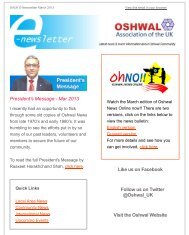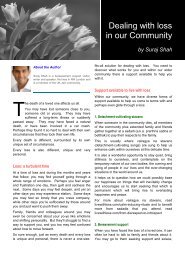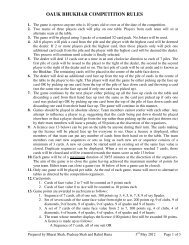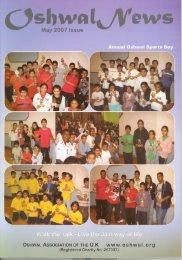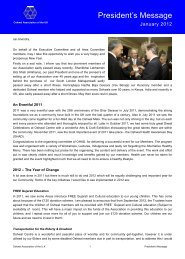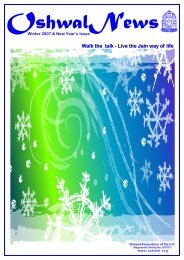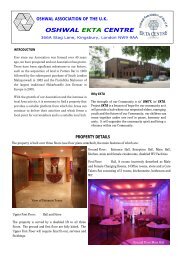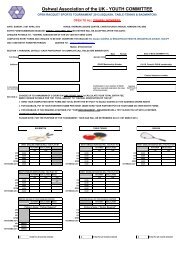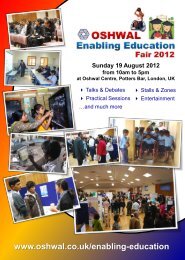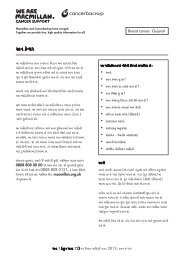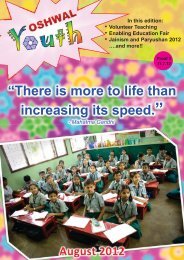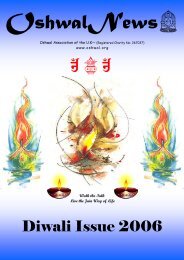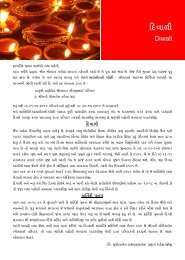First Ever E-Magazine | December 2011 | www ... - Oshwal Centre
First Ever E-Magazine | December 2011 | www ... - Oshwal Centre
First Ever E-Magazine | December 2011 | www ... - Oshwal Centre
- No tags were found...
Create successful ePaper yourself
Turn your PDF publications into a flip-book with our unique Google optimized e-Paper software.
EditorialOn behalf of the <strong>Oshwal</strong> M&C TeamThe theme for <strong>2011</strong> was “Together for a better worldfor all: Including persons with disabilities indevelopment.”Jai Jinendra,Welcome to the first ever <strong>Oshwal</strong> News E-<strong>Magazine</strong>!This Special Edition E-<strong>Magazine</strong> is a joint collaboration bythe <strong>Oshwal</strong> Media & Communication (M&C) team andEnabling Network, to mark the <strong>2011</strong> International Day ofthe Disabled Person on 3rd <strong>December</strong>.A Voice for Disability IssuesAs Urvina Shah explains in her article entitled “What isEnabling Network?” on page 4, disability within the<strong>Oshwal</strong> community is a very real and tangible issue, butat times is treated as a taboo issue. Many disabledmembers of our <strong>Oshwal</strong> Family have become disengagedand disenchanted with the wider <strong>Oshwal</strong> community.There are various reasons for this as was highlighted in arecent workshop held on disability issues at <strong>Oshwal</strong><strong>Centre</strong> in September <strong>2011</strong>.To raise awareness of disability issues and address someof the concerns of the disabled members of ourcommunity, the OAUK Executive Committee formallyestablished Enabling Network as a new committee inOctober <strong>2011</strong>. This means that the disabled members ofour community now have a direct voice within the <strong>Oshwal</strong>Association of the UK (OAUK) Executive Committee. Thisis a fantastic step forward for our community.International Day of the Disabled PersonThe annual observance of the International Day ofDisabled Persons was proclaimed in 1992, by the UnitedNations General Assembly resolution 47/3. Theobservance of the Day aims to promote an understandingof disability issues and mobilize support for the dignity,rights and well-being of persons with disabilities. It alsoseeks to increase awareness of gains to be derived fromthe integration of persons with disabilities in every aspectof political, social, economic and cultural life.As explained on the United Nations’ website “Personswith disabilities make up an estimated 15 per cent of theworld’s population. Almost one-fifth of the estimatedglobal total of persons living with disabilities or between110-190 million encounter significant difficulties.Furthermore, a quarter of the global population is directlyaffected by disability, as care-givers or family members.“Persons with disabilities encounter many disadvantagesin their societies and are often subjected to stigma anddiscrimination. They remain largely marginalized,disproportionately poorer, frequently unemployed andhave higher rates of mortality. Furthermore, they arelargely excluded from civil and political processes and areoverwhelmingly voiceless in matters that affect them andtheir society.“Experience shows that when persons with disabilities areempowered to participate and lead the process ofdevelopment, their entire community benefits as theirinvolvement creates opportunities for everyone – with orwithout a disability. Including persons with disabilities andtheir communities in developmental efforts is important toadvance the development agenda.“Thus it is imperative that development efforts around theworld include disability issues when determining policies,programmes, as well as allocating funds fordevelopmental programmes and projects. Mainstreamingdisability in development is a strategy for achievingequality for persons with disabilities…thereby contributingto the realization of a “society for all” in the twenty-firstcentury.” 1Thank you!Thank you to all those who contributed, many of whomhave shared very personal and somewhat difficult andemotional experiences they have had with disabilities.Without your contribution and courage this E-<strong>Magazine</strong>would not have been possible.Ashish Jayantilal Patani1 Extract from the United Nations’ website, <strong>www</strong>.un.org<strong>Oshwal</strong> News E-<strong>Magazine</strong> of the O.A.U.K. 3 <strong>December</strong> <strong>2011</strong> Edition
What is Enabling Network?by, Urvina ShahFrom there, through the guidance of Nirmal Shah (NorthWest Area Chairperson) and Chetan Shah (North WestArea Secretary), EN was established as a sub-committeeunder North West Area.According to The Papworth Trust, there areapproximately 650 million disabled peopleworldwide, which is around 10% of the world’spopulation. The UK is estimated to have 11 m illiondisabled people, or approximately 17% of the population.The alarming truth is that within our own <strong>Oshwal</strong> Familywe have no consistent and reliable information regardingdisability. If we were to apply the national average of 17%to our community of 25,000 strong, this would meanapproximately 4,250 people are likely to have somedisability within our community.The UK Government’s vision is to ensure “by 2025,disabled people in Britain have full opportunities andchoices to improve their quality of life and be r espectedand included as equal members of society.” The questionis what are we as a community doing on this importantissue?Aims of Enabling NetworkWith this in mind ENABLING NETWORK was formed tochange perspectives, raise awareness and instil anunderstanding about disabilities (such as physicaldisability, learning difficulties, visual difficulties etc) tocreate a c ommunity of openness, tolerance and socialinclusion at all levels (such as religious functions, socialevents, sports activities, etc).EN’s longer-term aims would be to see those less able orwith learning difficulties be ac cepted as part of the<strong>Oshwal</strong> Family. EN has taken the first small stepstowards tackling disability issues within our community,but we need your help if we are to achieve the longertermaims. If disability affects you or someone you lovethen come and j oin the EN team. Help us improve thequality of life of those affected.Enabling Network as a CommitteeEN was established on 2nd October 2010 during the<strong>Oshwal</strong> Career & Development Fair, where it held a smallworkshop looking at disability issues.Following on from the September <strong>2011</strong> workshop ondisability issues, EN was formally established as acommittee by the OAUK Executive Committee in October<strong>2011</strong>.EN Committee MembersEN has 14 committee members as follows, each of whomis affected directly or indirectly by disability.• Anjali Gudhka • Ashish Patani• Dhiraj Shah • Jitendra Malde• Kalpi Shah • Rahki Haria• Rumit Shah • Sarita Shah• Shama Shah • Shital Shah• Smita Shah • Sweta Shah• Urvina Shah • Ushma ShahEN MembersAside from EN Committee Members, any <strong>Oshwal</strong>member who is either directly or indirectly affected bydisability or has specialist knowledge about disabilitymatters can be a member of EN.Membership of EN is free and open to any <strong>Oshwal</strong>member. To become a member please contact EN as percontact details below.Membership of EN will help strengthen the voice aboutdisability issues within our community further to bringabout much needed c hanges to educate and raiseawareness about the range of disability issues within ourcommunity and also to support the disabled members ofour community to help them re-engage with the wider<strong>Oshwal</strong> community.Working together we can make things better for all<strong>Oshwal</strong> members, irrespective of their abilities ordisabilities.EN ActivitiesDisability SurveyIn order to better understand how disability affects<strong>Oshwal</strong> members, EN has launched the disability survey,<strong>Oshwal</strong> News E-<strong>Magazine</strong> of the O.A.U.K. 4 <strong>December</strong> <strong>2011</strong> Edition
~ What is Enabling Network? ~which is a questionnaire, available for download from the<strong>Oshwal</strong> website (<strong>www</strong>.oshwal.org).This will better help to understand the requirements ofdisabled members and help better events planning in thefuture. If disability affects you or someone in your family,please download and complete this questionnaire andsend it to the EN team.Workshop on Disability IssuesEN members held a workshop on Sunday 25thSeptember <strong>2011</strong> a t <strong>Oshwal</strong> <strong>Centre</strong> to discuss disabilityissues and br ainstorm ideas of how we as a c ommunitycan tackle these issues. See full article entitled“Workshop on Disability: A Report” on page X.<strong>Oshwal</strong> Health Awareness DayEN members had a s tall at the recent <strong>Oshwal</strong> HealthAwareness Day (OHAD) on 1 3 November <strong>2011</strong> at<strong>Oshwal</strong> <strong>Centre</strong>. Several EN members and volunteersgave their valuable time to raise awareness about arange of disability issues at the OHAD.Sharing experiencesMany of the EN members have written articles about theirpersonal experiences with disability and put together a listof useful website links which can be accessed on thedisability page on the <strong>Oshwal</strong> Website (<strong>www</strong>.oshwal.org).Furthermore, EN members have collaborated with the<strong>Oshwal</strong> Media & Communication team, to produce thisfirst ever <strong>Oshwal</strong> News E-<strong>Magazine</strong> to celebrate the <strong>2011</strong>International Day of the Disabled Person.<strong>Oshwal</strong> Lift ProjectEN members are involved in the <strong>Oshwal</strong> Lift Project,which will see the installation of a lift facility for thephysically challenged visitors at <strong>Oshwal</strong> <strong>Centre</strong>. To readmore about this project, please see article entitled“<strong>Oshwal</strong> Lift Project” on page X.More InformationEN team can be contacted as follows.E-mail: en@oshwal.orgMobile: 07981 130 471Web:Urvina Shah<strong>www</strong>.oshwal.orgEnabling Network<strong>Oshwal</strong> News E-<strong>Magazine</strong> of the O.A.U.K. 5 <strong>December</strong> <strong>2011</strong> Edition
Visual Impairmentby, Rumit Pravinchand ShahI have been on the EnablingNetwork Committee for the lastone year since it started and Iwish to share my experience onvisual impairment.There are large numbers of Visual impairments peoplecan have including Retina Pigmentosa, RetinaDetachment, Glaucoma, Muscular Degeneration,Cataract etc. I have had some of these conditions for thepast 15 years. About 4 years ago, I had to stop drivingsince I could no longer meet the DVLA driving standard.I work near Reading and live in London, so travelling towork daily without a car is an issue. Luckily, a number ofother people from work also live in London and I am ableto car share with them. On some occasions, I have usedNetwork Rail to travel to work or stayed overnight in aBed and Breakfast.I am an Electrical Engineer and work for the National GridCompany. At work, I am in an office environment andspend most of my time on the computer. I have a slightlylarger computer screen through the Display ScreenEquipment (DSE) Assessment legislation.Travelling to <strong>Oshwal</strong> <strong>Centre</strong> is also a challenge sincethere is no public transport for the final bit. I have mainlytaken car lifts from friends and f amily for this andsometimes used a taxi. I usually don’t like asking for liftsfrom other people and sometimes I decide not to go to theevents rather than trying to arrange a lift.Despite these hurdles, I have been very active incommunity events for the past 20years with various organisations.Recently, I volunteered at the<strong>Oshwal</strong> North West SavantsariBhojan, <strong>Oshwal</strong> MELA and EnablingNetwork Workshop. It was veryencouraging to see a number ofpeople with Visual Impairment takingpart in these events. I am still able toparticipate in events and volunteerbecause my eyesight is fine atpresent, for normal activity in lightedenvironment.a visual impairment. Other people will only know if weinform them.Royal National Institute for Blind (RNIB) and MoorfieldsEye Hospital are very good sources of information forpeople with visual impairment. You may also wish to meetother people within the community with visual impairmentthrough Enabling Network. This may give us anopportunity to learn from each other and s hareexperiences.If you have knowledge or experience of visual impairmentthen please inform Enabling Network and help us developthe knowledge and services for the benefit of otherpeople by engaging and submitting articles that may berelevant to increase awareness. Also please make fulluse of the services Enabling Network may provide.More InformationRoyal National Institute for Blind<strong>www</strong>.rnib.org.ukMoorfields Eye Hospital<strong>www</strong>.moorfields.nhs.uk/EyehealthEnabling NetworkEmail: en@oshwal.orgMany people including myself do notcarry a white stick or otherequipment. Therefore, it can bedifficult for others to realise we have<strong>Oshwal</strong> News E-<strong>Magazine</strong> of the O.A.U.K. 6 <strong>December</strong> <strong>2011</strong> Edition
What is it like in Inclusive Education?by, Shital ShahMy name is Shital Shah, am 37 years old, andhave Cerebral Palsy. My father is MansukhLakhamshi Shah and mother Niruben; sistersare Ushma and Priya Shah. I joined Enabling Network tobring about changes in the <strong>Oshwal</strong> Community. I wouldlike, in particular, for <strong>Oshwal</strong> members to embrace theabilities of the physically challenged people, and not toignore them. M y vision is to help build a communitywhere everybody is treated equally.I had my primary education inKenya up to the age of 8years. In Kenya there were nofacilities for people withdisabilities, so my parentsdecided to emigrate to UnitedKingdom in 1982.I had enrolled in Elmgrove <strong>First</strong>School from age of eight, thefirst disabled person in a‘normal school’. It was good tobe with able-bodied children,though I did not feel differentand the teachers were pleasant as well. I graduated fromthat school and was moving up to Elmgrove Middleschool and the attitudes were the same. I encountered ahurdle at age ten years when the school’s administrationteam had a meeting with my parents to discuss placingme in a s pecial school. My parents, who are veryoutgoing, thought a m ove would disadvantage mylearning; they had heated discussions with variousauthorities and s ucceeded in continuing my education ina mixed school with able bodied students with the help ofan assistant.This assistant helped me with just the physical tasks.After my time at this school, the school started taking onother disabled youngsters, who had physical difficulties.After my time at Elmgrove, I was enrolled into WhitmoreHigh School, again the first disabled person in a ‘normalschool’. Here, it was a lot more different, but some issuespersisted. I made many friends here and was assisted toand from classes. After my first year, the authoritiesdecided to build ramps and lifts to make it easier for me togo from one level to the next. I stayed at Whitmore HighSchool for four years.Westminster. During my four years study, I did not needa support assistant because I would copy from my friendany notes that I needed. Examinations were conductedin a separate room, and I was provided with a scribe whowrote my answers.After these seventeen years of education, I have attaineda BSc Honours in Computer Science and a HND inSoftware Engineering.What is Cerebral Palsy?Cerebral palsy (CP) is an umbrella term encompassing agroup of non-progressive, non-contagious motorconditions that cause physical disability in humandevelopment, chiefly in the various areas of bodymovement.Cerebral palsy is caused by damage to the motor controlcentres of the developing brain and can occur duringpregnancy, during childbirth or after birth up to about agethree. Resulting limits in movement and p osture causeactivity limitation and are often accompanied bydisturbances of sensation, depth perception and othersight-based perceptual problems, communication ability,impairments can also be found in cognition; and epilepsyis found in 1/3. CP, no matter what the type, is oftenaccompanied by secondary musculoskeletal problemsthat arise as a r esult of the underlying etiology. Of themany types and subtypes of CP, none have a knowncure.Source: http://en.wikipedia.org/wiki/Cerebral_palsyMore InformationNHS Websitehttp://<strong>www</strong>.nhs.uk/conditions/cerebral-palsyThen I started my three years study at Stanmore College.Again I was given a support assistant, for the physicaltasks. After these three years I enrolled at University of<strong>Oshwal</strong> News E-<strong>Magazine</strong> of the O.A.U.K. 7 <strong>December</strong> <strong>2011</strong> Edition
A Lawyer on WheelsBy, Sapna Shahfocus in my goals. She is with me in all my classes andassists me with all my activities such as going to therestroom and carrying me.I have the most loving neighbours, relatives and f riendswho take care of me when my parents have gone out andthey also cook for me. My teachers and c lassmatesalways help me at university to take tables from one classto another, to turn the pages of my books and o therassistance that I need.My name is Sapna Ratilal Shah and I have MUSCULARATROPHY, a condition in which I am physicallychallenged. I cannot walk therefore am in a wheelchairbut despite this, I have achieved two degrees,PSYCHOLOGY (2006) at USIU and LAW (2009) atUniversity of Nairobi. I was doing both degreessimultaneously but I stopped law as I was ill for two yearsand resumed in 2008.Doing two degrees together was challenging, as I had todo assignments, projects and exams in both universities.Sometimes ten subjects in one s emester was stressfulbut my determination and courage helped me completemy degrees. The other challenge was commuting fromone university to another as both were far from eachother. I currently study at Kenya School of Law to becomean advocate.Apart from studies, I have hobbies that relax me such assinging, playing the keyboard, going clubbing andsocialising and reading articles and magazines. This yearI have taken up a new challenge of being an inspirational/motivational speaker and w riting a book about myexperiences in these twenty-five years. My life has notbeen perfect as I have always faced discrimination frompeople and many do n ot understand my situation but Iignore the negatives, as I know who I am and what I cando.HIRAN, a friend and inspirer, whose words I will neverforget in the future always told me “Never give up and bepositive and you will achieve anything you wish to.” In thisarticle I would like to thank him for giving me courage tostart life again after I was ill, as I was very scared to doanything at that time.My message to everyone is “Be determined and braveand take all difficult situations as challenges to succeed.”My message to society is “do not shun the disabled, theyneed support, caring and loving and they are no differentto others.” Some disables’ I know are smarter and arevery talented too.Article by,Sapna ShahMy parents have been my supporters throughout my lifeas they have sacrificed a lot of things to bring me where Iam today and to make me an independent lady who canwork and earn a living for herself. My brother and sister inlaw have always given me moral support and told me Ican do the impossible as my brother always tells me thatmy brain muscles are sharp even though I cannot walk.Alice (my maid) or second mother always helps methroughout my endeavours ever since I was two yearsold. She says she wants to see me go very far in life andone day I will become a judge. She helps me maintain my<strong>Oshwal</strong> News E-<strong>Magazine</strong> of the O.A.U.K. 8 <strong>December</strong> <strong>2011</strong> Edition
Never Give Up HopeBy, Parul ShahMy name is Parul Pravind Shah. I was born in London onthe 21st October 1979 in North Middlesex Hospital. Aftera month of being born the doctors had discovered that Ihad a murmur (a hole in the heart) which then led me tohave asthma at a later stage of my development. I stayedin London for several months and then my parents tookme to Arusha in Tanzania. In November 1980 my brotherAlkesh was born in Arusha.On the 31st January 1981 after attending a l ovely lunchthat was hosted by an aunt and uncle in Moshi my mum,dad, aunt, granddad and I were returning back to Arusha.As we were returning back to Arusha a l orry came fromthe opposite direction and it collided into our car. Mygranddad passed away instantly and I was taken toKilimanjaro Christian Medical <strong>Centre</strong> in Moshi. I sufferedhead injuries and had a s mall scar on my left hand. Asthe doctors tried to treat the injuries, I fell into a coma. Iwas in a coma for up to 3 or 4 days and the doctors feltthere was little hope of survival and told my parents thatthey should keep praying to God for my survival. As thetreatment at the Kilimanjaro Christian Medical <strong>Centre</strong> wasnot working, one of my uncles brought me to London andI was admitted to Great Ormond Street Hospital for SickChildren. My parents were still back in Arusha, Tanzania,so my aunt and uncle cared for me. Due to the extent ofmy injuries, I had to have a few operations at GreatOrmond Street Hospital for Sick Children. In conjunctionwith this, I also attended North Middlesex Hospital for eyetreatment that I had injured in the accident. For severalmonths I had to wear an eye patch on the right eye. Theinjuries that I suffered from the accident were VisualImpairment, Speech Impairment and Right Facial Palsy.In 1982 I had to make several visits to Great OrmondStreet Hospital for Sick Children to assess the progress ofmy treatment and i n 1983 I received squint surgery atNorth Middlesex Hospital in London.In June 1983 my parents and my brother arrived in theUK. From 1984 or 1985 until 2000, I attended schoolinginstitutions from primary to secondary school. Myeducational life took longer than normal to finish due tobeing in hospital to undergo some major operations suchas eye surgery, facial grafts, treatment for facial palsy andclosure of my hole in my heart. During my schoolingyears, I was often bullied but also receivedencouragement from certain teachers, friends and myparents, which enabled me to carry on.Despite these set backs, I completed 8 GCSE’s andattained a G NVQ in Leisure and T ourism at advancedlevel.Whilst I was at secondary school, I gained workexperience in a variety of places where I took on variousroles and duties. Between the years of 1995-2000, I wasa library assistant, a reprographics assistant, a secretaryand a chef. Each job taught me something new or I taughtmyself which increased my confidence and enabled me tobecome independent. Some of the things that I taughtmyself were how to use the Risograph photocopier andhow to use the word application on the computer.Examples of skills I gained through my work experiencewere training younger pupils to become librarians,cataloguing books, administrative tasks, organisationskills, communication skills, presentation skills and foodknowledge.Between May 2001 and October 2001, I attended EnfieldTraining Services where I did an N VQ Level 1 i nAdministration and Prep for Work.Then in October 2001 I had started attending CommunitySystems where I did Business Administration usingInformation Technology. I also achieved my EuropeanComputer Driving Licence through the completion ofseveral modules which included: Basic concepts ofInformation Technology, Using a computer and ManagingFiles, Word Processing, Databases, PowerPointPresentations, Internet and E-Mail, Windows’ 98 andOffice 97. This course had lasted for 6 months. As well asdoing these modules I had to look for a job. I wrote manyletters to many companies and I also looked in thenewspapers as well. But unfortunately because I had littleexperience, it was hard to find a job.In February 2003, I underwent another eye operation tocorrect a squint and eyelid in my right eye.In September 2005 I started voluntary work as a teachingassistant at Bowes Primary School. I helped children readand spell, carried out Library duties and administrativetasks and took charge of the stocktaking.Also each year I did a presentation to explain what Diwaliwas and why we celebrated it to a Year 3 class. As wellas explaining the reason behind it I also showed the classthe different types of Rangoli patterns that we do duringthe festival.Between October 2009 and May 2010, I carried out morevoluntary work at Garfield Primary School where I helpedout in the school office with photocopying, shredding olddocuments, tidying the stock cupboard, stamping theschool address in the library books and l aminating thework for the class teachers.In November 2010 I started volunteering at Raa (UK)Limited for a couple of days a week. The ManagingDirector was impressed with the work that I was doingand in June <strong>2011</strong> I had started a par t time job as anAdministrator. As well as having a part-time job I am stillcarrying on with my voluntary work at Bowes PrimarySchool every Tuesdays.<strong>Oshwal</strong> News E-<strong>Magazine</strong> of the O.A.U.K. 9 <strong>December</strong> <strong>2011</strong> Edition
~ Never Give up Hope ~My Manager encouraged me to carry on with myvoluntary work as well and I joined a group called theSansaar group.Even though I didn’t have many friends during myeducation period, throughout my life I have met so manypeople who have come and gone and I would like to callthem my friends and family.I try to keep in touch with the friends that I did make overthe years through Facebook.In my free time I like to watch TV, listen to both Indianand English Music, going to the cinema, reading anddoing puzzles.I have travelled with my parents to Kenya and Indiamainly to visit my relatives but I have also gone to see thedifferent temples and t he forts that the country has tooffer.I have a lot of support from my cousins, aunts and uncleswho I meet up with now and then at family occasions,meals together and by going to see a play or a f ilm sothat I can keep in touch with them.In order to carry on regardless of the difficulties faced, Ihave to use my inner strength and resources, which Ihave developed over time through sheer determination.None of this would have been possible without theencouragement, praise and support from family, friends,my boss, teachers and most of all my parents. All of thishas given me the confidence, will power andindependence to tackle any challenge by giving it my bestshot and not giving up.In spite of what has happened to me in the past I can stillcarry on enjoying the life that has been given to mebecause no one knows what the future has in store. Eventhough I still get upset about what happened to me, I cancarry on living my life and learning new things, meetingnew friends and being more active. Life is too short so Ialways try to move forward rather than backwards.So my message to you is ‘NEVER GIVE UP HOPE’. Afterall, what have you got to lose!Article by,Parul Shah<strong>Oshwal</strong> News E-<strong>Magazine</strong> of the O.A.U.K. 10 <strong>December</strong> <strong>2011</strong> Edition
Who looks after Carers?by, Varsha DodhiaCarers – members of the family and friends whocare for people with disability and long termconditions"When dad took ill it was a complete shock toour family but we just had to manage and geton with it," explained Jayshree. "I was a carerfor seven years before I ever knew aboutsupport or services available for Carers – itwas a very demanding and hard journey”.Carers take on a lot of responsibility and at times itcan be a l onely place, with little support andprofessional training. Husband and wife oftencannot go out at the same time as one of them needs tobe at home. There are examples of young people aged 8or 10 who take on caring roles for their parents. Here aresome facts about Carers which many people do notknow:far short of the national minimum wage of £5.93 perhour (<strong>2011</strong>-2012 figures).Carers UK, a c harity providing support in this areaexplains: “The number of people providing round theclock care has increased by 50% in recent years. Thesocial care system is in crisis and severely underfunded.This has devastating consequences for older anddisabled people and a knock-on effect for carers whohave no option but to fill the gap. Many families areoutside the social care system altogether and get no helpwhatsoever and others face a constant battle for the mostmeagre of services. Carers are paying the price with theirhealth, income and careers”.In London, the Census data shows that the South Asiancommunity has the largest percentage of Black Asian andMinority Ethnic Carers, Indian Carers being the highestpercentage among these groups. For us, caring is anatural role in our lives, and we need to understand thesystem and s upport services that are available to us asindividuals and as a community.1 in 8 adults in the UK (around six millionpeople) are carers.• If we estimate that there are 25,000 <strong>Oshwal</strong>s in theUK and we have more than 4,000 people withdisability and/or long term condition then we musthave over 3,000 people who can be called Carers.That is a significant number of people.• A lot of our community Carers are not recognised onany official lists within the Local Authority where theylive. As a result, they do not get the support serviceswhich Carers desperately need and can benefit from.Carers save the economy £119 billion peryear, an average of £18,473 per carer.• Over 3 million people juggle care with work. Howeverthe significant demands of caring mean that 1 i n 5carers are forced to give up work altogether.• The main carer's benefit is £55.55 per week for aminimum of 35 hours, equivalent to £1.58 per hour -Among the London BoroughsBarnet has a good Carers centre in North Finchley. Brenthas a centre in Wembley, Harrow a centre in NorthHarrow and Hillingdon in Uxbridge. All Carers shouldhave some training regarding first aid, lifting and handling,health and safety. Carers also need advice on managingtheir own finances, understanding how best to help theperson they care for, sometimes they may need advocacyservice if they are facing difficulties in getting what theyneed.<strong>Oshwal</strong> News E-<strong>Magazine</strong> of the O.A.U.K. 11 <strong>December</strong> <strong>2011</strong> Edition
~ Who looks after Carers? ~Do you know that as a Carer one shouldhave their own Carers Assessment?Adult Carers who are providing in excess of 10 hours ofcare per week for a person aged 18 or over have a rightto a carer’s assessment. Young people caring for an adultfamily member will receive an assessment even if theyare caring for less than 10 hours per week. A carer’sassessment is a s et of questions that will identify howcaring impacts your life .It helps to work out what supportmight be of fered to you. A carer’s assessment can becarried out even when the person you care for refuseshelp or an assessment for themselves.• Help with supported living• Accompanying to lunch or dinner or activitiesOfficials often see all Asian communities as homogenousand yet they are extremely diverse.There are misconceptions about extended family supportthat may not exist; bulk of the caring role is on one or twopeople in the family. “They look after their own” is oftenechoed in discussions about providing services.A direct result of not coming forward and asking for helpis that there are few services developed that suit ourcultural needs.What are the barriers that Carers face?Carers often feel they have a duty for caring and shouldnot complain. Sometimes they struggle on their own andtheir own health suffers and sometimes they faceisolation. Carers who look after people with learningdisability or mental health condition or dementiasometimes find it hard to talk to others about their caringrole. For older Carers, language is often a bar rier andlack of knowledge about whom to approach and how theycan ask for help.Breaks from their caring role make a huge difference inhelping carers to continue – it is not a luxury – for a carerit is essential to their well-being and ability to carry on.And, if they are unable to carry on caring, there willpotentially be enormous care costs.If you're the main carer of the person you're looking after,one way you can look after yourself is by taking anoccasional break from your caring responsibilities this isknown as respite care. Carers can use respite care totake a hol iday or a break, or time off if they're illthemselves. You might take a break for a week, onemorning each week, or just occasionally.A way forwardWe need t o develop a stronger voice and help ourcommunity Carers with support and ad vice. Recentchanges in the way Social Services provide care bymaking it more suited to the individual called“Personalisation or Personal Budgets”. Local Authoritiesare now being encouraged to provide individual budgetsfor people with care needs and f or carers. This meansthat you should be offered choice in the way that servicesare provided, and may be able to use the funding toorganise services yourself. This means people who aredisabled or suffering from long term conditions can planand have a m uch bigger say in the type of care theyreceive.We have a w ealth of knowledge as well as communitymembers who have had to manage the system. If we canharness their expertise for the benefit of all Carers wewould be i n a m uch better position to influence otherservices that are available.Article by,Varsha DodhiaRespite care can include:• Day-respite services, where someone will come intoyour home during the day to care for the person youlook after, giving you a chance to go shopping, meetfriends or have time for yourself.• Residential care in a home for a short period of time• Offer companionship and conversation therebystimulate mental awareness – sitting service• Help with travel arrangements for hospitalappointments and/or assessments<strong>Oshwal</strong> News E-<strong>Magazine</strong> of the O.A.U.K. 12 <strong>December</strong> <strong>2011</strong> Edition
Barnet Asian Carers Groupby, Suresh P. ShahAfter much pressure from Asian community LondonBorough of Barnet decided to start day centres for Asianresidents. Initially a room was allocated within an existingday centre for Asian residents and the numbers werelimited. The services offered were not adequate for ourneeds.In a s hort time, carers of Asian members visiting all daycentres in Barnet came within the group. This assisted indirect negotiations with Barnet on some issues.SupportFor carers the group provided the following support:In early 90’s a few of us got together to form Barnet AsianCarers Group (BACG). When BACG was formed initiallythe activities were primarily focussed on i ncreasingawareness for Asian residents.The initial hurdle was that members were not prepared tocome to day centres. Some preferred to stay alone athome and were reluctant to join a day centre. During aquick survey we found the main reasons were:• A perception that people would talk about them goingto a day centre• Children unhappy and also felt guilty if someonetalked about them• Some parents were not allowed to leave home forsuch an event• Lot of distrust about servicesHowever as our group became more formalised westarted to tackle the shortcomings in services beingoffered.CampaignsThe group was involved with following campaigns:• To ensure one good vegetarian meal was provided tomember’s coming to the day centre as well asproviding a ‘ meals on wheels’ service for housebound elderly people• To ensure continuation of Asian day centres whenBarnet announced cuts in budget.• Training sessions were held to teach how to handledisabled human body• Training sessions on relaxation techniques• Training on how to tackle pressure of looking afterdisabled or old members of family• Information on services available in Barnet• Counselling service• Diwali get togetherThe group was recognised by Barnet and listed in theirdirectory.The group continued for several years but sadly due tolack of support was wound up. During its existence lots ofassistance was given by Nila Patel, Ramnik Shah andSaroj Parekh.Finally running such groups brings a lot of satisfaction asit adds value to people in need. Such carers group can bestarted easily and once the aims are finalised then it isbest to affiliate with the local or national carer’s group. Acontact also needs to be maintained with local authoritysocial department. Many established charities are alwayswilling to assist. Sky is the limit of what the group wishesto achieve.Article by,Suresh P. Shah• To ensure more beds were provided where Asianresidence facility was available• To request more respite care beds for Asians.<strong>Oshwal</strong> News E-<strong>Magazine</strong> of the O.A.U.K. 13 <strong>December</strong> <strong>2011</strong> Edition
Obsessive Compulsive Disorderby, Chandu ShahA PersonalExperienceMy wife Kanta and I act as carers toour son Deepan, who was diagnosed with Obsessive-Compulsive Disorder (OCD) in 1989. He was 22 years old.Deepan was a very bright student and achieved a BSc (Hons) inFinance at the London School of Economics.He was on h is way to becoming a chartered accountant, butduring final year at the university he began to have problems. Afriend who is a Consultant in America noticed something waswrong with Deepan's behaviour during our holidays in USA. Hesuggested that we get medical advice in UK and any helpneeded.At the beginning of his illness, people and community membersused the words like ‘pagal’ and ‘ganda’. We did not knowwhom, besides the GP, we should speak to and get help from orguidance, i.e organisations / local council / Care <strong>Centre</strong>s / ourown community.In fact, when we contacted <strong>Oshwal</strong> Welfare section, they had noinformation available at that time.Today Deepan is still a v ery smart person, but he i s deeplyaffected by his mental illness. He is terrified of germs and doesnot leave his flat except for two days when he goes to the DayCare centre. K anta and I dedicate over 100 ho urs a w eekbetween us to his care, house keeping, shopping, cooking etc.plus transporting to day care centre twice weekly and for all hismedical appointments.My son has a s evere illness, but he i s still my son and thewonderful intelligent person he has always been.I am glad to see Enabling Network being formed within the<strong>Oshwal</strong> Community who will be able to provide a signpost andguide all the community members suffering from variousdisabilities.About OCDObsessive–Compulsive Disorder (OCD) is a seriousanxiety-related condition. It has 3 main parts:• Thoughts that make you anxious (obsessions)-thoughts, worry, distressing pictures in the mind, doubts,the need for perfection and ruminations that will not goaway.• The anxiety you feel (emotions)- tense, anxious, fearful,guilty, disgusted or depressed. You feel better if you carryout your compulsive behaviour, or ritual - but it doesn't lastlong.• The things you do to reduce your anxiety (compulsions)-correcting obsessional thoughts, carrying out rituals,checking and rechecking, avoidance, hoarding and theneed for reassurance from others that all is well.OCD sufferers may achieve diagnosis and treatment late partlydue to a lack of understanding by the individual and healthprofessionals and partly because of the feeling ofembarrassment, guilt and sometimes even shame associatedwith what is often called the ‘secret illness’.It’s important to remember that severity of OCD differs markedlybetween people but each person’s distress is very real. Peoplewith OCD are not ‘mad’ or dangerous and do not carry out theirunpleasant thoughts. Most people with OCD know that theirthoughts are excessive or irrational but the anxiety they feelmakes the thoughts difficult to ignore.The cause of OCD is much debated but it is likely to result froma combination of factors. In addition to this, the cause for oneperson may differ from that for another. OCD can run in familiesand, in some cases, may be associated with an underlyingbiochemical imbalance in the brain.TreatmentOCD is indeed a c hronic, but also a v ery treatable medicalcondition. Most people can learn to stop performing theircompulsive rituals and to decrease the intensity of theirobsessional thoughts through Cognitive Behavioural Therapy(CBT). C BT is a f orm of talking therapy that focuses on theproblems a per son has in the here and now and helps themexplore and understand alternative ways of thinking (thecognitive approach) and to challenge their beliefs throughbehavioural exercises.For some people a combination of CBT and medication can beeffective. Medication may reduce the anxiety enough for aperson to start, and eventually succeed in therapy.Support and HelpThere are various organisations and charities that providesupport and information such as MIND, OCD ACTION, OCD-TODAY AND OCD-UK. The royal college of psychiatrists alsohas information leaflets on OCD.A person with OCD can learn to manage symptoms so that theywon’t interfere with daily functioning. This allows them to regaina much-improved quality of life, but it is also possible, with theright support and treatment to achieve a complete recovery fromOCD. Fortunately, the medical profession is slowly starting tounderstand and identify OCD symptoms much more effectively,resulting in an improvement in treatment; however, it does stilldepend on which part of the country you may live in. OCDsufferers and their families need to seek help and support andknow that the help is out there and they are not alone.<strong>Oshwal</strong> News E-<strong>Magazine</strong> of the O.A.U.K. 14 <strong>December</strong> <strong>2011</strong> Edition
Riks’ StoryContributed by, Anthony Nolansimilar tissue types. Currently only 4% off donors on theregister are of Asian ethnicity.I was first diagnosed with Acute Myeloid Leukemia(AML) in2009; prior to the diagnosis I had always considered myselfto be very fit and ac tive, a regular g ym goer and footballplayer. The diagnosis was nothing short of devastating notjust for me but my family. We went from a r elatively busy“normal” life into a world of uncertainty about the future.I wasthrown into five months of intensive chemotherapy followedby months of recovery, prior to this I had never spent even aday in hospital.Following treatment I eventually returned to work and pickedup the threads of my life… as youcan imagine it was a case of lookingover “our shoulder” in case thedisease returned. I was closelymonitored following the treatment,the hospital appointments were asyou can imagine extremely stressful.Statistically the likelihood of the AMLreturning diminished over time with two years being aparticularly significant milestone. We eventually reached thispoint and we had dared to start to believe the nightmare wasbehind us. Unfortunately this was not to be the case.I was recently re-tested following what appeared to be asimple bout of flu; I went for routine blood tests which to cuta long story short culminated in receiving the bombshell thatthe leukemia had r eturned. I am now back in hospitalundergoing chemotherapy however I will as part of thetreatment require a bone marrow transplant. I do not have asibling match so will require a stem cell donor…a search ofthe database to find a suitable match is currently in progresshowever I have been advised there are significantly fewerdonors on t he register from the Asian sub-continent. Iwondered why this was, given the vast numbers of “BritishAsians” (me included) living in the UK. I can only surmisethat it is possibly a fear of the donation process which has inthe past been shrouded in myth and misinformation; I havesince learnt a great deal about the process of becoming adonor and whereas at one t ime it was an onerous processmedical advances have now made it fantastically simple andstraightforward. The facts of stem cell transplants are thatpeople from the same ethnic heritage are more likely to haveTo initially register you simply provide a sample of saliva, ifat some future date you were asked to become a stem celldonor the process itself is little more than an enhanced blooddonation. The impact on the donor is minimal, certainly thereare no adverse health implications, your body will simplyrecuperate… but the outcome for the recipient is nothingshort of life saving.Jenner Large, regional recruitment manager with AnthonyNolan, said, “Anthony Nolan does everything it can to findmatches for the people who need them. However, thechallenge increases for a patient from any ethnicbackground because there are fewer people on the registerfrom these groups. It really is easier than many people thinkand you could save a life.” The main criteria to be a donor isthe individual has to be between the age of 18 - 40, weighover 8 stone and generally be in goodhealth. There is an urgent need foryoung men to join the register aspatients outcomes improve when thedonor is a young male and sadly,currently only 12% of the entire registeris made up of 18 - 30 year old maledonors, regardless of ethnicity.I mentioned earlier that I have a family; I have a wife and twodaughters as well as my extended family and friends, I valuethem greatly and want to be around to help and s upportthem. Take a good l ook around at your own family andfriends and I ’m sure you feel likewise. This is an aw fuldisease, it can hit anyone, healthy, old, and y oung it doesnot discriminate. It could strike anyone… taking a little timeout now to register (honestly it is so simple) will haveminimal impact on y our life but you can rest in theknowledge that if you become a donor you could save a life.Register now and address the shortfall in Asian donors, weshould not need t o conduct worldwide searches for donorswhen there are so many of us here, ultimately we will allbenefit. Registering is an “ investment” in our collectivefutures whether it is family friends or the wider Asiancommunity.More InformationFor more information or to register go to<strong>www</strong>.anthonynolan.org<strong>Oshwal</strong> News E-<strong>Magazine</strong> of the O.A.U.K. 15 <strong>December</strong> <strong>2011</strong> Edition
Neurological Conditionby, Vaishali Rajesh ShahMy name is VAISHALI RAJESH SHAH and Isuffer from an UNDIAGNOSEDNEUROLOGICAL CONDITION which has had abig effect on m e and m y life. My condition affects myspeech, vision and both fine and gross motor skills aswell as my freedom of movement as I am in a wheelchair.Despite the fact that my needs are complex, I manage toenjoy life and achieve my dreams and goals.Throughout my life, I have been educated in a mainstream environment. I started in the Nursery when I was2 years old and back then I could walk with tripod sticksor a walker. At around 7 years old I started to use awheelchair because of the growth spurt which made melose balance due to gravity.I attended different kinds of treatments which were painfuland took a long time.The people I met in school had a big influence on me andgave me courage to do things as well as able people, byputting in all the effort and har d work into my studies.With the help of computers, (which is one of my lifelines,)and from assistants and my mum, who supported me withscribing and note taking, I managed to do c lass/homework, assignments, projects and exams in school/collegelife. Despite all the hardships, last year I completedBTEC Level 3 in Business Studies with DoubleDistinction.I have currently started doing a distance learning virtualacademy course to achieve English and Mathsqualification and I am really enjoying trying out this newtype of learning and getting in touch with other people.Apart from studying I have hobbies that relax me as wellas help me interact with friends and family. I like playingcard games, board games, socialising, watching moviesand going out and about. Also I enjoy listening to music,both Indian and English, and my favourite singers areLionel Richie and Stevie Wonder. My regularprogrammes on TV are Neighbours as well as Home andAway. I am a computer fanatic who can spend a wholeday playing games on the computer, checking my emailsand keeping in touch with my friends on facebook.backbone who not only is a mother but also my therapist,tutor, friend, icon and m y fashion consultant. My fatherand mother are my inspiration from whom I have learnt somany values of life, family morals, cultural and religiousbeliefs and most of all concepts of humanity.I love and enjoy travelling and my parents have made thispossible by taking me on ho lidays to many differentcountries where I have been able to explore and enjoythe wonders of the world, cultural and religious sights andsceneries of places from America, Kenya, and India.I would like to say a huge thank you to both my parentsfor doing a lot for me in life that has made me what I amtoday. Apart from my parents, I consider myself verylucky to have been born into a very close and supportivefamily, both paternal and maternal sides. With so manyuncles, aunts, cousins, nieces and nephews, life hasnever been dull as everyone’s love, support andencouragement has enabled me to learn and getsomewhere in life. My brother, who is not just a “bro” butso much more to me that I cannot express in words andmy grandparents – Dada, Dadi, Nana and Nani, wellthese are all four to me like my GOD. They have been myparent’s foundation stones and with their support, myparents always believed and said to us “never give upand be s trong and positive and you will get the taste ofthe fruits you wish to achieve”.My message to everyone is “Never under estimateanyone from their outer looks but be brave anddetermined to take all difficult situations as challenges tosucceed.”It is with pride and luck that I was born an <strong>Oshwal</strong> and aJain. We have done well in every sphere of life and havealways supported each other. T he same strength andvision needs to be shown when it comes to less ablebodies like me and also my parents. They need as muchsupport as I do.My parents have been my supporters throughout my lifeas they have sacrificed a lot of things to bring me where Iam today. Especially my mum, who has never oncelooked back for herself but has given me all the courageand taught me everything from being a little fragile girl toa smart young lady. Throughout my life she has been my<strong>Oshwal</strong> News E-<strong>Magazine</strong> of the O.A.U.K. 16 <strong>December</strong> <strong>2011</strong> Edition
Neuro-diversityOrlando Bloom, Whoopi Goldberg, RichardBranson, Albert Einstein, Steve Redgrave,Winston Churchill…….The list goes on but whatdo the above names mean to you? Yes, they are famousand successful in their field. Do they have anything elsein common? Answer at the end.<strong>First</strong>, I want to share with you some of my journey withtwo special people in my life.After years of desperation and heartbreak, I finallybecame a mum. Bringing our adopted 4 week babyhome, made me the proudest person on earth. He camehome with all my aspirations for him, his life planned outin my mind. I had an ideal picture of how parenthood wasgoing to be. At last, we were going to be ‘normal’ asperceived by society at that time for a couple, except thatit didn’t work like that. In a way, being childless was seenas a disability by society at that time.Yes, we now had a child but it was by means of adoptionso still not ‘normal’! I was asked does he speak ‘gujarati’when he was a 4 w eek baby and the classic – do youknow who his parents are? Today, I get the question dothey know they are adopted? Fortunately, the adoptionprocess and our own strength helped us face society withdignity and rise above the pity.Back to my gorgeous child, all was going well, most of thedevelopmental milestones were fine - sitting up, feeding,walking, etc. I attended all the usual mother and babygroups and got together with friends with children of thesame age. This was great except that it meant I did whatwe human beings are good at, COMPARING. Is your sontalking, is he d oing this, is he ou t of nappies…. And thelist goes on.At the back of my mind, there was a niggling feeling but Iput this to the side and wanted so much for my child toconform to ‘normality’. He was quite clingy and hatedbeing in public places. He did not crawl and startedwalking very early or rather running. I was always themum with the child running around, out of control. Westopped going to people’s houses because of fear ofbreaking something. As he got older, things got evenharder as he would say or do s omething odd. Hewould freak if there was something new or wechanged the routine. Even today, preparation isparamount before we attend a social function or goto a new environment.Of course, there was also people’s attitude towardsmy child. Not many people understood or stillunderstand and can be quite judgmental and hurtful,often without thinking or realising. Even today, Icringe when they ask me something about him whenhe is standing there and can speak and understandeverything. I know it hurts him when people askabout which university he is at or has he got a job? Itis not my feelings that I worry about, it is my child’shurt that I cannot bear. The helplessness at notbeing able to change things to make it better for himis unbearable at times. He didn’t ask to be ‘different’.At school, he was always the different one in someway but not obviously. Physically he looks fine butsocially he is ‘different’. He loved playing football sowas quite happy to socialise with other children whoenjoyed the same fervour for running around andkicking balls. The socialising was still a bi t differentthough. Play dates were always hard work. Littlefights or little arguments but still no major alarm bellsrang. Gradually, things started getting difficult. I<strong>Oshwal</strong> News E-<strong>Magazine</strong> of the O.A.U.K. 17 <strong>December</strong> <strong>2011</strong> Edition
~ Neuro-diversity ~made my son’s life hell. Why can’t you do that, so and socan do it, why did you say that, you have to work harder.In my ignorance or stupidity, I would listen to my friends,do it like this, make him do that….. Then I would questionmy son, why can you not do t hat maths or understandwhat you have just read…. The list goes on and so didthe endless appointments with doctors, educationalpsychologists, therapists, diets, supplements, etc.I had waited so long for this child, why would there besomething wrong with him? Anything I found innewspapers, the internet, word of mouth, I took him to. Ispent a f ortune. Why? Because I was in denial that mychild could be different to what society calls normal. I sawan advert for a learning centre that could help withlearning difficulties and as always, picked up the phone,made an appointment, and off we went.This time, an honest and life changing opinion was given.I was told he had ‘mild learning difficulties’ anddevelopmental delay. He needed to be in a school thatcaters for this and not the mainstream academic schoolsthat I had been trying to fit him into. These were added tothe labels of dyspraxia, autism, semantic and pragmaticlanguage difficulties, and epilepsy that he already carried.He is not being difficult, lazy or anything else that I hadthought of him or been told about him from school, fellowparents and friends. He was doing his best and I had toaccept his limitations. However, I was also told that wecan teach him to stretch his own ability and nurture hisstrengths to build on his skills. That was the day that Igrieved and breathed a sigh of relief at the same time. Sodid my son (probably) because I backed off! MYIGNORANCE MUST HAVE MADE LIFE HELL FOR HIM.Life became enjoyable again. I accepted him for what heis and let him enjoy his life for himself not for what Iwanted for him. The journey since has not been easy andhas brought many hurdles with joyous moments too andcontinues to do so.Each day, I savour the fact that fate brought thiswonderful human being into our lives and h as enrichedour lives and made us stronger, to the extent that nobooks, no other person, no material things could ever do.Today, he is a f ervent 19 year old facing life in the bestway he can, accepting that he is different but also doinghis best to ‘fit into our society’. I no longer worry aboutwhat people may think about his behaviour or hisachievements because they are the ignorant ones and wehave nothing to be as hamed of. I hold my head up highand savour every thing he achieves because he hasworked so hard to do it, it is worth more than anyuniversity degree or any other sign of success thatsociety measures with. Each small success that he has,we celebrate as if he has won the Nobel Peace Prize. Hemay not conform to ‘society’s norm’ but he has specialqualities that many don’t have. He is the most caringperson I know. He has taught me so much about life thatno book or educational establishment could have done.Seven years later, after bringing my son home and aftermuch deliberation of whether we should have anotherchild in the family or not, would it be fair on our son, etc.,once again, fate played a p art and after a lengthyadoption procedure, we brought my daughter home. Thistime, I didn’t bring home with her, my own plans of herfuture mapped out in the same way. But I certainly didpray at the back of my mind that this child will be ‘normal’or perhaps not have any disabilities because ‘I can’tcope’. Well, I got my comeuppance for that thoughtbecause beautiful and intelligent as she is, she started toshow signs of something not being right. Totally differentto my son though. Totally with it, at 12 years old, sociallyand emotionally much more able but academically, herewe go…. My first thoughts were oh no, I can’t do thisagain. But somehow, we always get the strength to dealwith what life throws at us. She has difficulty with workingat speed, her reading and writing skills do not match herverbal ability. Again, teachers used to say, she will neverbe academic, she lacks confidence, she doesn’t try hardenough….. The list goes on. But I am now wiser. Shecannot do it because there is a real barrier to herlearning. We have found the right school that nurturesand brings out the best in her. What label does this childcarry? I have another child that is neuro-diverse but in adifferent way to my son. She is dyslexic.So here you have it, WE ARE THE PROUD PARENTSOF TWO NEURO-DIVERSE CHILDREN!! My childrenhave taken me on a journey which has resulted in my life,career and out look being completely different to thatperson who started motherhood with ‘an ideal’ picture oflife. I share my life with others quite openly because wehave nothing to be as hamed of. By sharing, I learn somuch about helping my children and often, help otherswho are lost and d o not know what they can do. I stillhave a lot to learn.Back to the list of famous people.Were you going to say all those people I named are allneuro-diverse? Yes they are all dyslexic. Does thatchange your opinion of them? Is dyslexia a disability or anability?Neurodiversity (ND) refers to a r ange of conditions thatcause people to process information differently from theway the majority of people do. It includes dyspraxia, AD(H)D, Asperger's syndrome, dyscalculia and dyslexia.These are sometimes called Specific Learning Difficultiesor differences.<strong>Oshwal</strong> News E-<strong>Magazine</strong> of the O.A.U.K. 18 <strong>December</strong> <strong>2011</strong> Edition
~ Neuro-diversity ~DyslexiaMany people still think of dyslexia as being about writingletters back to front, or seeing words move around thepage or just being illiterate and even being ‘stupid’. Well,letter reversals and visual distortion are often symptomsof dyslexia due to visual processing weaknesses ordisorders but they are not the only ones.However as more research is carried out, more is knownabout this learning difference as we realise that there aremany areas which are affected by this learning difference,not just reading and writing. Yes learning difference, not alearning disability. People learn in different ways. No twopeople are the same.In all, the British Dyslexia Association estimates thatapproximately 10% of the population will have somedegree of dyslexia, of which about 2% will be severelyaffected. (<strong>www</strong>.bdadyslexia.org.uk)AutismA quote from the National Autistic Society website:“People with autism have said that the world, tothem, is a mass of people, places and events whichthey struggle to make sense of, and which can causethem considerable anxiety.” (<strong>www</strong>.autism.org.uk)Autism affects in particular, the ability to understand andrelate to other people. Taking part in everyday life andsocial interaction can be particularly difficult. Most of usappear to know, intuitively, how to communicate andinteract with each other. Individuals with autism have tolearn this skill.Autism is a l ifelong developmental disability. It is part ofthe autism spectrum and is sometimes referred to as anautism spectrum disorder, or an ASD. The word'spectrum' is used because, while all people with autismshare areas of difficulty, their condition will affect them invery different ways. Some are able to live relatively'everyday' lives with little or no support; others will requirea lifetime of specialist support.Unfortunately, even today, there is still a stigma in societyabout any learning difference, not just by the personaffected but his/her family and friends too. Is it ignoranceor fear of being treated differently or unfairly? The realityis that any one who learns differently or at a slower paceis often tarnished with the ‘stupid’ brush, when in fact theycan be t he gems of any organisation or community,thanks to their often extraordinary gifts.<strong>Ever</strong>yone has strengths and is good at something. THINKOF IT AS AN ABILITY AND BE PROUD OF BEINGDIFFERENT.More InformationBritish Dyslexia Association<strong>www</strong>.bdadyslexia.org.ukNational Autistic Society<strong>www</strong>.autism.org.uk<strong>Oshwal</strong> News E-<strong>Magazine</strong> of the O.A.U.K. 19 <strong>December</strong> <strong>2011</strong> Edition
Global Developmental DelayOur daughter was born at 38 weeks and s eemedto be d eveloping normally. Some of hermilestones were late for example, she sat at 9months, started walking (rather clumsily) at 17 monthsand was only able to say a few words. She had a goodpencil grip but could not switch on a light with one finger.She fell all the time. She could not walk up and downstairs the normal way i.e, one f oot at a time. She keptdropping things. These are just some examples.Comments like ‘she’s the middle child, so would talklater’, ‘you are a paranoid mother’, ‘it’s the nappy thatmakes her walk like that’, from the professional bodies,delayed our reactions to accepting that something wasamiss.Nevertheless, having suspected something was wrong,we pushed the health visitor to assess her at home for aperiod of 2 hour s after which a c onclusion was reachedthat something was indeed wrong. A t this stage, we asparents were still in denial about her issues, partlybecause we didn’t really appreciate the extent of herdifficulties, the need for a ‘ typical’ child and the lack ofany conclusive evidence by the health professionals.Soon after we went on holiday to Canada where a familyGP suggested we should get an opinion from adevelopmental paediatrician. Following an assessment,he diagnosed her as ‘hypotonic’ (low muscle tone), withspeech and language delay.This hit home hard! To some extent we started goingthrough a grieving process of denial, anger, mourning butnot yet acceptance.Back home, we approached the NHS for help anddirection. We saw a community paediatrician,occupational therapist (OT) and speech therapist (ST).The help and processes frustrated us greatly withirregular provisions, lack of a MDT approach and no realanswers. In order to get things moving quickly, wedecided to give our daughter regular private OT and ST.Our daughter was now 2 yrs old and we started noticingbehavioural problems. These stemmed from her lack ofcommunication skills and our inability to understand herfurther exasperated by her lack of fine and gr oss motorskills.<strong>Oshwal</strong> News E-<strong>Magazine</strong> of the O.A.U.K. 20 <strong>December</strong> <strong>2011</strong> Edition
~ Global Developmental Delay ~Her progress was very slow and highly frustrating. Asparents, we were still of the belief that things wouldchange and she would be a t ypical child. Our lack ofunderstanding led to the development of anxieties andconfusion in her. To look at, no one would be any wiserof our daughter’s condition as she looked normal.Perhaps that was what we wanted to see as well.However having a third child and observing his normaldevelopmental progress brought home to us therealisation of the widening gap in our daughter’sdevelopment, compared to the norm.Between the ages of 3-5 and a half, she changed 3schools due to the fact they didn’t have the resources orknowledge to deal with her. Finally through a privateeducational psychologist assessment, we were referredto a small independent school that specialised in childrenlike our daughter. We visited the school and once shewas accepted, this was the point at which we finallyaccepted that this was to be a l ong-term condition withchallenges that may be life long.Our daughter settled down very well and gained in selfconfidenceand self-esteem. Her progress is still slow butshe is improving continuously and our goal is to make herindependent, self sufficient and happy.We found the educational and health system not to bevery helpful and b ecame disillusioned by it. It seems forconditions such as hers, it is a mine field even for theprofessionals so what hope is there for the layperson?Our daughter has never been given a diagnosis and socame under the umbrella of Global Developmental Delay.Through various assessments and reports, we are justbeginning to understand her condition. To summarisethese, our daughter has a sensory-based motor disorderwith a postural disorder and speech and language delay.She is a v ery happy child who gains information of theworld around via her senses particularly vision, smell andtouch.An Overview of Global Developmental DelayA Global Developmental Delay is a general term used todescribe a condition that occurs during the developmentalperiod of a child's life (birth to age 18). It is usuallycharacterized by lower intellectual functioning and isaccompanied by significant limitations in communication,self-care, home living, vocational, academic skills, leisure,health and safety).Global Developmental Delay has many different causeswhich ultimately affect the functioning of the centralnervous system (Trauma to the central nervous system,Fetal Alcohol Syndrome, genetic disorders, metabolicdisorders, etc).Common signs may include:• delayed acquisition of milestones: the child is late insitting up, crawling, walking• limited reasoning or conceptual abilities• fine/gross motor difficulties• poor social skills/judgment• aggressive behaviour as a coping skill• communication problemsMore informationMencap<strong>www</strong>.mencap.org.ukChildren like her can learn but need the opportunity tolearn from non-traditional ways such as visual,kinaesthetic and through repetition, praise andencouragement. It needs understanding and patience onour part and an ability to see the world through her eyes.In spite of all the challenges we face and will continue toface, we feel blessed to have a beautiful and lovingdaughter who has taught us humility and acceptance thatevery child is special and have their own unique needs.Her progress may be slow and her accomplishmentssmall and she may require support for years to come butshe was given to us as a special child who plays aleading role in our lives.<strong>Oshwal</strong> News E-<strong>Magazine</strong> of the O.A.U.K. 21 <strong>December</strong> <strong>2011</strong> Edition
Peaks and troughs of a Family Facing a Disability IssueBy, Urvina and Vijal ShahDisability in whatever varied form it arises is like ahurricane that swirls around furiously and has animpact reaching far beyond its central core called"the eye". However, unlike the natural versionwhere the spiralling wind and storms eventually fizzle out,the storms created by a disability in most cases is for alifetime and i ts trail of emotions is a t angled web thatknows no end.The spectrum of emotions is such that a mere article suchas this only provides a cursory glance into anenvironment that at one e nd is full of distress and w oeand at the other also immensely enriching.In our case, faced with a young child with a learningdisability i.e. a virtual disability buried deep into the child’spsyche, the rollercoaster of emotions - the peaks andtroughs - are challenging to say the least.TroughsThe emotional terrain encountered ranges fromconfusion, denial, sense of loss, hopelessness, anger andmost worrying of all is the uncertain future that the childwill face as she gets older in a world that is increasinglyintolerant. For the parents, siblings and the extendedfamily their state of mind is always on a cliff-edge.The impact of the disability on the entire family is aunique family experience and affects all aspects of familyfunctioning. For example:emotional and verbal communication at all times anddiffusing any other noise from this.Relationship impact with extended family – this can bechallenging as members of the extended family, whilstsupportive and providing a haven for emotional respite forthe parents or the siblings are nevertheless bystanders tothe drama occurring on the front line.Financial costs – family financial resources willinevitably be strained as these will be diverted totreatments, consultations and schooling if applicable forthe affected child and at the same time balancing thefinancial needs for the rest of the family.PeaksWithout demeaning or denying the challenges presentedto families with a disabled person, there are manypositive aspects that we as a f amily unit have gainedsuch as:• Not to take things for granted• Tolerance and sensitivity• Learning to be patient• Putting oneself in the world view of the affected childbuilding a greater knowledge about disability issues.• Expanding a wider social network to encourage aChanges in home routines – this has to bespecifically set out from the outset andweighted more towards the affected childthan others – scope for spontaneity islimited.Relationships between siblings – this canbe strained due to lack of understanding,particularly when siblings are at an agewhere tolerance levels have not matured.Vocational life – Professionalgoals/aspirations and basic life assumptionswhen starting up a family need to beevaluated to align the demands of theaffected child.Relationship impact between the parents– the strength of this is of paramountimportance and the key to this is maintaining<strong>Oshwal</strong> News E-<strong>Magazine</strong> of the O.A.U.K. 22 <strong>December</strong> <strong>2011</strong> Edition
~ Peaks and troughs of a Family Facing a Disability Issue ~broader assimilation of ideas.• Adopting a broader outlook for self and the othersiblings• Increasing our inner strength• Enhanced family cohesion• Encouraging connections to community groups.It is important to emphasize that these strengths areavailable to most families who are simply “raising a child”.However, these positive adaptations are morepronounced to ensure a better coping strategy isdeveloped when faced with a difficulty.CounsellingAn essential part of the coping strategy is to seekcounselling. The ability to wade through the emotionaltroughs mentioned above through the power ofcounselling cannot be underestimated. As a couple,counselling helped us to articulate our thoughts and madeus realise the extent to whether we were truly aligned inour approach to help our child.Whilst family support is paramount and provides thevirtue of fortitude to persevere and overcome thetribulations in one’s life, seeking outside help is anessential part of getting some clarity of thought. Anindependent counsellor whom we met over a p eriod ofmonths was a great source of help. We felt however thatan even more powerful source of strength was linking upwith other affected families. Sharing experiences and warstories with people who are in a s imilar position, is apowerful way of putting things in perspective. Oneimmediate negative it erases from the mind is the feelingof isolation.Community NetworkSeeking out an appropriate counsellor or even affectedfamilies was not an easy process and certainly somethingyou could not easily tap into or out of easily. There areresources and a m ultitude of organisations from outsideour community but we feel that the community network isa good starting point for families facing disabilities as theyshare the same values, beliefs and culture.As part of last years’ successful <strong>Oshwal</strong> Career &Development Fair, a small group of individuals wereasked to organise a s mall workshop focused ondisabilities issues faced by members of our community.From this, Enabling Network (EN) was formed led byUrvina. EN has empowered us as it has given us anopportunity to share our experiences and meet interestingand like minded people.We hope that Enabling Network provides an effectiveforum that can not only support families affected bydisability but also raise awareness to help instilunderstanding and banish myths regarding all disabilitiesin the wider community.This in itself will go a long way to help affected familiesmove away from the troughs and sustain the peaks.More Informationabout EnablingNetworkTel: 07981 130 471Email: en@oshwal.orgWeb: <strong>www</strong>.oshwal.org<strong>Oshwal</strong> News E-<strong>Magazine</strong> of the O.A.U.K. 23 <strong>December</strong> <strong>2011</strong> Edition
ENABLING NETWORK (or “EN”) has been formed with the guiding principle of “Embracing all Abilities”. The key aimsof EN are to change perspectives, raise awareness and i nstil an u nderstanding about disabilities (such as physicaldisability, learning difficulties, visual difficulties, etc) to create a community of openness, tolerance and social inclusionat all levels (such as religious functions, social events, sports activities, etc).Workshop on Disability IssuesTo this end the EN team organised a workshop back in September <strong>2011</strong> to both highlight disability issues within ourcommunity as well as engage people with special needs to see what we as a community can do better. Since theworkshop, the EN team has been busy analysing the data collected and devised some plans to take this feedbackforward. The flow chart below summarises this analysis.<strong>Oshwal</strong> News E-<strong>Magazine</strong> of the O.A.U.K. 24 <strong>December</strong> <strong>2011</strong> Edition
~ ENABLING NETWORK ~Since the Workshop on Disability Issues the EN team has been engaged in a number of activities, highlighted below, toraise awareness of disability issues within our <strong>Oshwal</strong> community.<strong>Oshwal</strong> Health Awareness DayOverviewThe EN team took part during the recent <strong>Oshwal</strong> Health AwarenessDay on 13 November <strong>2011</strong> at <strong>Oshwal</strong> <strong>Centre</strong>, to raise awarenessabout disabilities issues. The focus was on g uiding <strong>Oshwal</strong>saffected by disability to external sources of help as well as raisingawareness about what the requirements of disabled persons are,such as to have occluded spectacles to demonstrate the difficultiesfaced by the visually impaired.Volunteers HelpAside from the EN Committee Members, many volunteers helpedout at the EN stall at OHAD. These volunteers came directly fromthe attendees of the EN Workshop, which was held earlier in theyear on 25 September <strong>2011</strong> a t <strong>Oshwal</strong> <strong>Centre</strong>. The volunteersincluded: Bakul Shah, Deep Shah, Hiten Shah, Jyoti Shah, ParulShah, Roshni Shah, Sanjay Shah, Suresh Shah, Varsha Shah,Vijal Shah.It was great to see so many volunteers come on board and help theEN team out. Many of the volunteers were directly affected bydisabilities themselves and provided valuable insights into raisingawareness of disability issues.Making ContactsThe OHAD was a great forum for making new contacts within thewider <strong>Oshwal</strong> and Asian community with organisations which caterfor the needs of the disabled. EN team members took theopportunity to network with several of these organisations and willbe looking to see how these can be developed to see how benefitsto <strong>Oshwal</strong> members can be realised.<strong>Oshwal</strong> News E-<strong>Magazine</strong>Published in <strong>December</strong> <strong>2011</strong> on the <strong>Oshwal</strong> WebsiteEN worked with <strong>Oshwal</strong> M&C team to produce an e -magazine tocelebrate the International Day of Disabled Person <strong>2011</strong>.The annual observance of the International Day of DisabledPersons was proclaimed in 1992, by the United Nations GeneralAssembly. The observance of the Day aims to promote anunderstanding of disability issues and mobilize support for thedignity, rights and well-being of persons with disabilities. It alsoseeks to increase awareness of gains to be derived from theintegration of persons with disabilities in every aspect of political,social, economic and cultural life.This E-<strong>Magazine</strong> is available for download from the <strong>Oshwal</strong>website (<strong>www</strong>.oshwal.org). The EN team are pleased to reportthat various articles have been contributed towards this E-<strong>Magazine</strong> and hopes it will greatly help to raise awareness aboutdisability issues.For more information, contact the Enabling Network team on:E-mail: en@oshwal.org | Mobile No: 07981 130 471 | Website: <strong>www</strong>.oshwal.org<strong>Oshwal</strong> News E-<strong>Magazine</strong> of the O.A.U.K. 25 <strong>December</strong> <strong>2011</strong> Edition
~ ENABLING NETWORK ~<strong>Oshwal</strong> Lift ProjectImproving Accessibility at <strong>Oshwal</strong> <strong>Centre</strong>One of the primary needs for many people both disabled andelderly, is better accessibility at <strong>Oshwal</strong> <strong>Centre</strong> between theupstairs and downstairs halls. EN team have been researchingvarious options for the installation of a disabled lift facility at <strong>Oshwal</strong><strong>Centre</strong>.EN members have drafted a report for the <strong>Oshwal</strong> Lift Project andhave submitted a copy to the Property Management Committee fortheir consideration.EN team would encourage and ur ge the EC members to put inplace a formal plan for the installation of a lift at <strong>Oshwal</strong> <strong>Centre</strong> toimprove accessibility.Forthcoming EN EventsThe following activities are planned by EN for 2012. Watch out for moredetails soon on E-newsletters and <strong>Oshwal</strong> Website.Spring time: Be Informed Talk and Social EventShort presentations by speakers on l earning differences, Autism,Cerebral palsy and visual/hearing impairment.Informal social to share information and ideas.Summer time: Disability and Inclusive Education weekendA mega 2-day event will be a combination of talks, workshops for advice and benefits, practical sessions for variousdisabilities and educational needs such as educational statements. A play/movie may be planned for this event too, allwith a view of raising awareness about disability issues and t o encourage more integration of able and disabledmembers of our community.Dates, venues and times for the above events to be confirmed and may be subject to some changes.The following are also being worked on by the EN team:Sports Inclusion – integration of sporting activities for able and disabled members.Making it happen!EN has been recognised as an official sub-committee of the EC and all 14 members of the sub-committee are eitherdirectly or indirectly affected by disability and we will do our utmost to fulfil the role expected of us by the community forthe community.Our hope is, that this in turn, will empower and inspire both the able and less able to be part of a community that is richin talent, knowledge and skill and are willing to share this with each other.For more information, contact the Enabling Network team on:E-mail: en@oshwal.org | Mobile No: 07981 130 471 | Website: <strong>www</strong>.oshwal.org<strong>Oshwal</strong> News E-<strong>Magazine</strong> of the O.A.U.K. 26 <strong>December</strong> <strong>2011</strong> Edition
General InformationAs an <strong>Oshwal</strong> Member always first consider hiring facilities at <strong>Oshwal</strong> <strong>Centre</strong> (Potters Bars) or <strong>Oshwal</strong> Mahajanwadi(Croydon) for your functions. By hiring these <strong>Oshwal</strong> venues you will be supporting your community.Weddings – Parties – Functions – Dances –Meetings – Conferences – etc.Phone the Administrators at either booking offices regarding hall availability and charges.OSHWAL CENTRECoopers Lane Road, NorthawHertfordshire, EN6 4DGTel: 01707 643 838Fax: 01707 644 562Info Line: 01707 661 066 (Recorded Messages)Email: admin@oshwal.orgWebsite: <strong>www</strong>.oshwal.orgOffice is open 7 days a week from 9am to 5pmOSHWAL MAHAJANWADI (Croydon)<strong>Oshwal</strong> house, 1 Campbell RoadCroydon, Surrey, CR0 2SQTel: 020 8683 0258(2pm to 5pm weekdays only)Gujarati School OfficeTel: 020 8664 9807(9.30am to 12.15pm Saturdays only)Marriage RegistrationBoth <strong>Oshwal</strong> <strong>Centre</strong> and <strong>Oshwal</strong> Manajanwadi are registered buildings for the solemnisation of marriage.Registration of a marriage at both venues will be part of a religious ceremony, i.e. it will take place during and withinthe Jain / Hindu religious marriage ceremony. For further information, please phone the administrators.SadadiIf you would like to find out whether a Sadadi is being held at <strong>Oshwal</strong> <strong>Centre</strong> or <strong>Oshwal</strong> Mahajanwadi, in respect of anydeceased <strong>Oshwal</strong>, you may ring the Information Line at the <strong>Oshwal</strong> <strong>Centre</strong> and a Recorded Message will advise of thetime of the Sadadi and the name of the person in whose memory the Sadadi is being held.Information Line Tel: 01707 661 066 (Recorded Message)Obituary / Shraddhanjali MessagesThe rate for inserting an Obituary / Shraddhanjali message in <strong>Oshwal</strong> News is £150.00 per page per issue.Please ensure that wherever possible a passport sized photograph (preferably in black and white) is enclosed with themessage which also should be written out very clearly and neatly. Please enclose your cheque and S AE for thereturn of any photos. Please note that it will not be possible to entertain any requests for proofs of these messagesprior to printing.<strong>Oshwal</strong> News E-<strong>Magazine</strong> of the O.A.U.K. 27 <strong>December</strong> <strong>2011</strong> Edition
Did you like this firstE-magazine?Would like to receiveE-magazines on a regularbasis?What other themes can weexplore in E-magazines? E.g.Finance, Health & Wellbeing,Education.COMING SOONWatch out for flip PDF E-magazines!!Email you comments & feedback to:oshwalnews@oshwal.org



